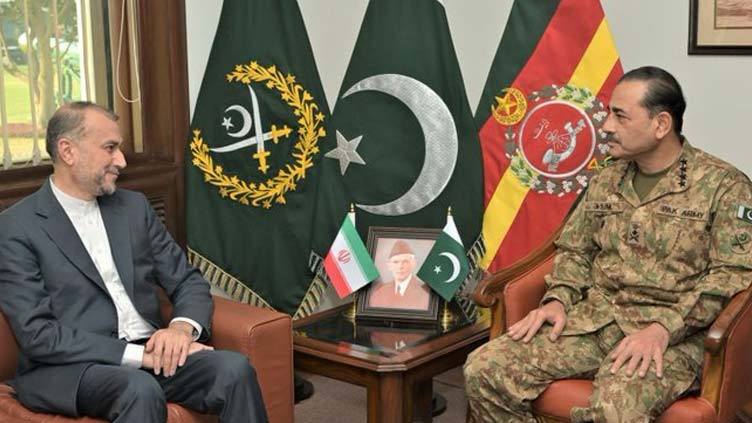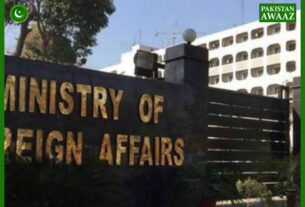1. COAS Munir and Iranian FM
Iranian Foreign Minister Hossein Amir-Abdollahian and Chief of Army Staff (COAS) General Syed Asim Munir have joined forces to combat the region’s urgent terrorism problem. This partnership emphasizes how important it is to present a single front when addressing security issues that pose a danger to both Iran and Pakistan. Enhancing collaboration between the two countries, exchanging intelligence, and organizing actions to counter extremist organizations operating along their shared border were the main topics of their talks.
The goal of this collaboration is to increase stability and security in the area. COAS Munir and the Iranian FM are making a strong statement against terrorism by pooling their resources and knowledge. A proactive strategy to counter the challenges posed by radical elements is the dedication to cooperative operations and information exchange.
2.Strengthening pakistan -iran Diplomatic Relations
An important turning point in Pakistan-Iran ties is the meeting between COAS Munir and the Iranian FM. In order to promote peace and stability in the area, both leaders underlined the need of diplomatic channels. Improved communication between the two nations can reduce miscommunication and foster trust.
Fighting terrorism requires bilateral cooperation. A more secure environment will be made possible by cooperative tactics, intelligence-sharing systems, and joint drills. Both countries acknowledge the threat that terrorism poses and know that effective counterterrorism efforts require coordination.
3. Major collaboration area
a. Intelligence exchange
In order to detect and eliminate threats, intelligence exchange is essential. Frameworks for productive dialogue and teamwork in the collection and analysis of intelligence data were deliberated by COAS Munir and the Iranian FM. Both countries will be able to react quickly to new threats thanks to this program.
b. Joint Military Training
Joint military drills will improve both countries’ armed services’ operational preparedness. These drills will concentrate on border security, humanitarian aid, and counterterrorism strategies. The military forces can improve their capabilities and promote cooperation by training together.
c. Initiatives for Border Security
In order to stop terrorists and smugglers from moving across the shared border, both presidents agreed that border security was crucial. Joint checkpoints, improved monitoring, and coordinated border patrols can all be used to efficiently manage cross-border operations and guarantee the safety of both country nations.
4.The Diplomatic Role
Dealing with the complicated problem of terrorism requires the use of diplomacy. The Iranian FM and COAS Munir emphasized the value of communication in addressing the root causes of extremism. Both countries may lessen the causes of radicalism by fostering social and economic advancement.
Furthermore, strengthening interpersonal relationships and cultural linkages can promote harmony and understanding. The goal of diplomacy should be to foster an atmosphere that encourages collaboration and lessens the possibility of confrontation.
5. Pakistan-Iran Collaboration for Regional Security
The collaboration between COAS Munir and the Iranian FM tackles issues of regional security in addition to counterterrorism. The Middle East and South Asia’s geopolitical environment is constantly changing, with new problems appearing on a regular basis. Together, Iran and Pakistan can tackle problems like organized crime, drug trafficking, and human trafficking—all of which frequently coexist with terrorism.
Furthermore, other nations in the region receive a strong message when we present a united front against terrorism. It encourages neighboring nations to work together to combat common dangers and shows a commitment to regional stability.
6. Recognizing the Causes of Terrorism
Understanding the underlying roots of terrorism is crucial to combating it successfully. Extremism frequently results from the interaction of social, political, and economic elements. An atmosphere that is favorable to radicalization can be produced by extreme poverty, illiteracy, and political disenfranchisement.
a. Radicalization and Economic Inequalities
Youth dissatisfaction and disappointment can result from economic differences in both Iran and Pakistan. People may become more vulnerable to radical ideologies that promise empowerment or transformation as a result of this dissatisfaction. Thus, tackling economic problems is essential to the war against terrorism. Both governments may contribute to reducing the circumstances that encourage extremism by offering social services, good education, and employment opportunities.
b.Using Education to Combat Extremism
One effective weapon in the fight against terrorism is education. Schools may combat extreme narratives by encouraging civic engagement, tolerance, and critical thinking. Both nations ought to make investments in educational initiatives that promote tolerance for other cultures and religions as well as the principles of democracy and human rights.
7. The Value of Involving the Community
In order to combat terrorism, community engagement is crucial. In addition to having the finest knowledge of possible dangers, local communities can be extremely helpful in halting radicalization.
a.Developing Community Trust
Both the Iranian and Pakistani administrations must interact with local populations in a courteous and open manner in order to foster trust. Creating avenues for residents to express their worries can aid in spotting such dangers before they become more serious.
b.Promoting Community-Based Initiatives
Extremist narratives can be refuted by grassroots programs that emphasize community development, social cohesiveness, and youth empowerment. Both governments may contribute to the development of a resilient society that is less vulnerable to radicalization by funding regional groups that support inclusiveness and peace.
8. Technology’s Importance in Fighting Terrorism
In the current digital era, technology is essential to both enabling and thwarting terrorism. Social media is used by extremist organizations to attract new members and disseminate propaganda, but technology may also be used to combat terrorism.
a.Observation and Monitoring
Cutting-edge technologies can improve monitoring and surveillance operations to spot and follow terrorist activity. To examine trends and identify questionable activities, intelligence organizations can use machine learning, artificial intelligence, and data analytics.
b.Combating Extremism Online
An active strategy is needed to counteract internet extremism. Governments and tech firms need to work together to create plans for locating and eliminating extremist information from social media sites. Campaigns for public awareness can also teach people how to spot and report questionable online activity.
9. Global Collaboration
International collaboration is necessary to combat terrorism. Addressing the transnational aspect of terrorism requires both Iran and Pakistan to interact with the international community. Cooperation can improve collaborative operations, capacity building, and intelligence sharing.
a.Participating in International Forums
Talking on counterterrorism tactics can be facilitated by taking part in multilateral gatherings. Member states can cooperate and share information by interacting with institutions such as the Shanghai Cooperation Organization and the United Nations.
b.Gaining Knowledge from International Best Practices
Analyzing other nations’ effective counterterrorism tactics can yield insightful information. Pakistan and Iran can both profit from other people’s experiences and modify their strategies to match their own circumstances by studying best practices.




